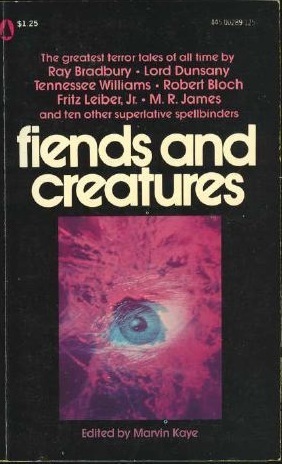I picked this book up because Marvin Kaye is the current editor of Weird Tales, and I wanted to see more of his work. He first began publishing in 1975 at the ripe age of 37. This anthology because it came out in 1975 is therefore his earliest published work, or close to it. They are mostly all Weird tales. In fact, some of them first appeared in that very magazine.
The premise for the anthology is "tales of absolute terror." That is probably just publisher's blurb hype. The stories mesh well. A common theme is a protagonist making a deal with the devil, getting what he wants out of it, and then trying to welch on the deal in some way or another. Not all of the stories are exactly this theme, so Kaye in his introduction broadens the scope by writing that the common thread is stories about fiends in general. The 16 stories all fit into 178 pages, some of which are blank, so they are on average rather short.
**** 13 • Enoch • (1946) • short story by Robert Bloch. This one is a quite disturbing view into the mind of a mass murderer.
*** 29 • Babylon: 70 M. • (1963) • short story by Donald A. Wollheim. A mildly entertaining musing on the antiquity of an obscure nursery rhyme.
*** 37 • A Midnight Visitor • (1892) • short story by John Kendrick Bangs. A slow-moving tale of a protagonist trying to outwit a devil.
**** 51 • The Vengeance of Nitocris • (1928) • short story by Tennessee Williams. An enjoyable if simple story set in ancient Egypt of a noblewoman exacting revenge.
***** 65 • The Three Infernal Jokes • (1915) • short story by Lord Dunsany. A clever tale of the devil's trickery almost succeeding.
** 73 • An Episode of Cathedral History • (1914) • short story by M. R. James. Early M. R. James. He got better. The title says exactly what the story is. If that sounds at all interesting to you, go for it.
*** 91 • Damned Funny • (1975) • short story by Marvin Kaye [as by Eugene D. Goodwin]. Kaye wrote an original story for his anthology. It is a light-hearted telling of how a modern man overestimates his cleverness and almost gets taken by the devil when he strikes a bargain only to discover his plan to welch on the deal doesn't come off as smoothly as expected. Not the devil's first rodeo.
**** 105 • Interim • (1947) • short story by Ray Bradbury. Great beginning of a story in this short short.
***** 107 • The Bottle Imp • novelette by Baron Friedrich de La Motte Fouqué (trans. of Das Galgenmännlein 1814) [as by La Motte Fouque] The oldest and still best version of this oft-told story of a bottle imp that grants the holder unlimited wealth at too high a price. It's easier to find the inferior versions of this story than this original one. Stevenson's version, for example, was actually made into a Classics Illustrated comic book.
** 131 • Crescendo • (1963) • short story by Richard Matheson. Somewhat silly story about a haunted church organ.
**** 141 • In the X-Ray • (1949) • short story by Fritz Leiber. A story of one twin haunting another.
*** 155 • The Generous Gambler • (1918) • short story by Charles Baudelaire (trans. of Le joueur généreux 1868) [as by Charles Pierre Baudelaire]. Maybe the devil doesn't so deserve his bad reputation after all.
*** 159 • Captain Murderer • (1860) • short story by Charles Dickens. More like a vignette of a Dickens character.
**** 163 • Bubnoff and the Devil • (1842) • short story by Ivan Turgenev. Very odd story of a Cossack's encounter with a devil.
***** 171 • The Shadow Watchers • (1975) • short story by Dick Baldwin. I loved this devil outwitting and what it ultimately says about human nature.
**** 185 • The Faceless Thing • (1963) • short story by Edward D. Hoch. This read a lot like a Stephen King or Peter Straub story. It was a revisiting by an old man of a childhood horror, but it was so short.

